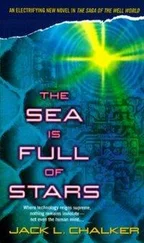Jack Chalker - Ghost of the Well of Souls
Здесь есть возможность читать онлайн «Jack Chalker - Ghost of the Well of Souls» весь текст электронной книги совершенно бесплатно (целиком полную версию без сокращений). В некоторых случаях можно слушать аудио, скачать через торрент в формате fb2 и присутствует краткое содержание. Год выпуска: 2000, ISBN: 2000, Издательство: Del Rey / Ballantine, Жанр: Фантастика и фэнтези, на английском языке. Описание произведения, (предисловие) а так же отзывы посетителей доступны на портале библиотеки ЛибКат.
- Название:Ghost of the Well of Souls
- Автор:
- Издательство:Del Rey / Ballantine
- Жанр:
- Год:2000
- ISBN:0-345-39485-2
- Рейтинг книги:4 / 5. Голосов: 1
-
Избранное:Добавить в избранное
- Отзывы:
-
Ваша оценка:
- 80
- 1
- 2
- 3
- 4
- 5
Ghost of the Well of Souls: краткое содержание, описание и аннотация
Предлагаем к чтению аннотацию, описание, краткое содержание или предисловие (зависит от того, что написал сам автор книги «Ghost of the Well of Souls»). Если вы не нашли необходимую информацию о книге — напишите в комментариях, мы постараемся отыскать её.
Ghost of the Well of Souls — читать онлайн бесплатно полную книгу (весь текст) целиком
Ниже представлен текст книги, разбитый по страницам. Система сохранения места последней прочитанной страницы, позволяет с удобством читать онлайн бесплатно книгу «Ghost of the Well of Souls», без необходимости каждый раз заново искать на чём Вы остановились. Поставьте закладку, и сможете в любой момент перейти на страницу, на которой закончили чтение.
Интервал:
Закладка:
They stayed over for a last native meal and a few hours rest in one of the road house cubicles, then felt ready to venture outside Kalinda for the first time.
Approaching the hex boundary was intimidating, since all of their senses told them it was an absolute barrier from the sea floor up through and past the surface. They watched as a few Kalindans emerged from Yabbo and headed toward the road house, and some Yabban natives did the opposite. It seemed effortless. There was nothing to do but to try it.
Going through the barrier had, curiously, little sensation. There was only a slight tingling, almost like passing through a very thin wall of cobwebs. Much more dramatic was the sudden shift in all their natural senses.
Kalindan water temperature, comfortable to them, was fairly cold for active ocean water; it varied only slightly, from five to seven degrees C. With their natural fatty insulation under that thick, leathery hide, it felt very nice indeed. But this water was very warm and would take some getting used to. The sounds and smells were different as well. It meant trying to sort out things all over again. There was a kind of distant roar that seemed unplaceable, and many other unfamiliar noises amidst the usual sonic bedlam. The water tasted sulfuric. Vision was okay but slightly clouded. The magnetic field sense, once away from the border wall, showed tiny things all around them, in the millions or even billions, numerous and thick. They felt as if the water was alive.
And it was alive. Even those tiniest of pinhead signals was coming from a concentration of microorganisms that seemed omnipresent. They couldn’t help but take them in with the water they breathed. As they swam, their stomach and digestive tract seemed to fill with them as well. They had to slow down so as not to choke on the food they were consuming.
Reminds me of Malacanus, Ming commented. Tropical but so bug-infested you needed a diving mask just to filter out the little bugs. Ever get there?
No, but I know what you mean. Never thought I’d consider putting in a food screen across my mouth, though.
Going slower was soon something they chose for other reasons as well. There was in fact less oxygen. They didn’t really notice it at first, but swimming suddenly required more of an effort. They breathed harder to take in more oxygen, which, of course, meant that they also took in more of the microorganisms.
They began struggling, and the thought in both their minds was that perhaps they should turn around and get back into Kalinda while they still could. They were about to do just that when they heard someone nearby say, “First time in Yabbo, I take it?”
They could hardly reply, but Ari turned and saw a fellow Kalindan floating, who seemed to have no problems at all. Ari managed to nod.
“Put your teeth together so they mesh but don’t clench,” the stranger instructed. “Let whatever is in your throat settle and go down a bit, and breathe normally through the teeth until you feel more like yourself.”
They tried it, and it did help, but it also seemed a temporary solution.
“Once you’re feeling better, close your mouth and relax it,” the stranger went on. “Don’t breathe through it. I know it goes against your instincts, but force yourself. You’ll get used to it. Wait a little bit and see what happens. It’s a trick they never tell you about.”
Little happened at first, and then their slitlike nostrils opened and began taking in water. Since these had heretofore only been used to breathe air into what passed for lungs when they were out of the water, there was a natural tendency to override and squelch this. At the stranger’s urging they fought it and quickly discovered that indeed the nostrils acted as a kind of bellows, and the water intake went not to the chest but to the gills. It wasn’t like air breathing; there was no exhalation. That function was taken over by the gills. Still, it worked. After a couple of minutes, they found the rhythm and it did seem to get much easier.
“Thank you, citizen!” Ari called to the stranger.
The Kalindan chuckled. “Just remember to swim only with your mouth shut and only speak when you’re hovering, and you’ll be okay,” she assured them. “To eat, just do it the old way. Makes it real cheap and easy to get through here, which is a good thing since we couldn’t eat anything the natives do anyway. Take it slow and easy, though. The nostril system does not deliver as much volume as the usual mouth method, and you’re dealing with lower oxygen content here as it is.”
Ari managed another nod. “Are you going into the country?” he asked the stranger.
“No, coming out. I’ve been here ten days, and that’s more than enough in this boiling kettle.”
Ari was grateful to the other for saving them from retreat or worse right at the start, but Ming was already at the next level and took over. The personality differences between them even in casual speech sometimes threw people. If the stranger noticed, however, she was nice enough not to react, or more likely put it down to their recovering from the initial problem and panic.
“Where did you come from, then, if I might ask?” Ming began.
“Abudan,” the stranger replied. “We’ve been designing a new transport line.”
“Transport line? I thought you couldn’t use any fancy technology here.” Both Ming and Ari were intrigued.
“This must be your first time outside Kalinda,” the other, an engineer, guessed. “Otherwise you wouldn’t confuse innovation with high energy sources. This is a volcanic place, and it’s very active. Our biggest problem with closed systems is dealing with seaquakes when lava shifts or steam creates new outlets. We can tap that energy, though—it’s quite natural, and it’s so steady in the volcanic fields that we can do wonders with it. All you need is pressure and a way to control it and you have useful power. Give me useful power and you have machinery that can do a lot. Remember, the limitations imposed on the hexes were originally put in to simulate the properties of other worlds far away so that they might support the creatures who dominate there. Getting around these sorts of environmental handicaps was part of the exercise. Of course, now, and for millennia, we’ve been on our own, so we can cheat guilt-free. They have shipped massive tons of this seafood garden to Kalinda since we grew too lazy to remain self-sufficient in food, as well as a number of minerals that are nuisances here but very useful in our manufacturing and even medical systems. We make conduits and pipes and other things that make their lives easier here, and can be run using only their technology. We all benefit.”
It sounded clear and simple, and gave the best, succinct examples of how the international and even interspecies economy worked.
“Do we do this with all our neighbors?” Ming asked her.
“Well, most of them. And some much farther off. We even trade some things with nations halfway around the world. That’s what those anchorages are for up top. There are some hexes, though, that just don’t have anything we want or need, or we don’t have anything they want or need, or they’re just so downright spooky and strange that we can’t deal with them. I’m told there are some races that shun all contact, that don’t even send ambassadors to Zone.”
“That brings up an interesting point,” Ari put in. “If you were in Abudan, there was a Zone Gate right there. How come you didn’t just use that to come home?”
The engineer laughed. “You must work for the government! Most ordinary folks can’t use those routes unless it’s a life or death situation. If we all did, why, the areas in and out of Zone would be crushed with people from all over and nobody could ever use them in an emergency or for diplomatic work. We do occasionally use them to ship delicate or time-sensitive stuff, but we have to set it up way in advance, on off-peak hours, using Yabban crews propositioned in Kalinda. The paperwork alone is a nightmare. No, I’m perfectly happy to go this way. After all, it’s only a few hours by tube to Banu City, just a kilometer or so back. After I clear here, I’ll pick up a company scooter and be in the office by midday tomorrow at the latest.”
Читать дальшеИнтервал:
Закладка:
Похожие книги на «Ghost of the Well of Souls»
Представляем Вашему вниманию похожие книги на «Ghost of the Well of Souls» списком для выбора. Мы отобрали схожую по названию и смыслу литературу в надежде предоставить читателям больше вариантов отыскать новые, интересные, ещё непрочитанные произведения.
Обсуждение, отзывы о книге «Ghost of the Well of Souls» и просто собственные мнения читателей. Оставьте ваши комментарии, напишите, что Вы думаете о произведении, его смысле или главных героях. Укажите что конкретно понравилось, а что нет, и почему Вы так считаете.












